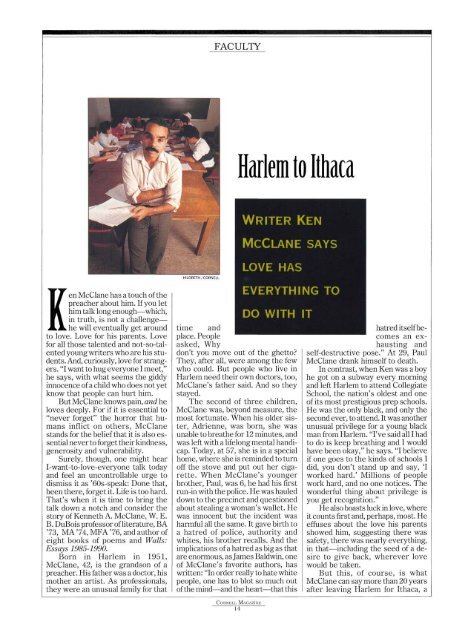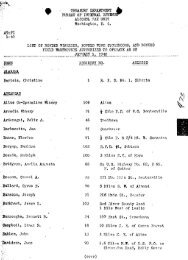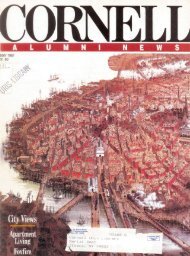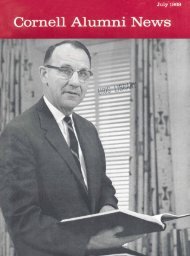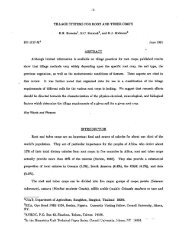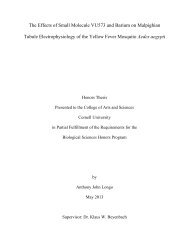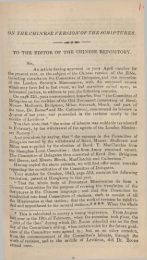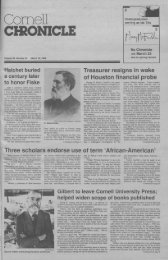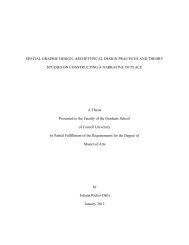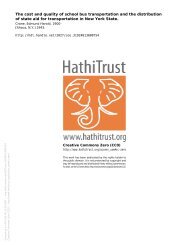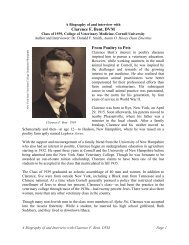1/1 - eCommons@Cornell - Cornell University
1/1 - eCommons@Cornell - Cornell University
1/1 - eCommons@Cornell - Cornell University
- No tags were found...
Create successful ePaper yourself
Turn your PDF publications into a flip-book with our unique Google optimized e-Paper software.
Ken McClane has a touch of the<br />
preacher about him. If you let<br />
him talk long enough—which,<br />
in truth, is not a challenge—<br />
he will eventually get around<br />
to love. Love for his parents. Love<br />
for all those talented and not-so-talented<br />
young writers who are his students.<br />
And, curiously, love for strangers.<br />
"I want to hug everyone I meet,"<br />
he says, with what seems the giddy<br />
innocence of a child who does not yet<br />
know that people can hurt him.<br />
But McClane knows pain, and he<br />
loves deeply. For if it is essential to<br />
"never forget" the horror that humans<br />
inflict on others, McClane<br />
stands for the belief that it is also essential<br />
never to forget their kindness,<br />
generosity and vulnerability.<br />
Surely, though, one might hear<br />
I-want-to-love-everyone talk today<br />
and feel an uncontrollable urge to<br />
dismiss it as '60s-speak: Done that,<br />
been there, forget it. Life is too hard.<br />
That's when it is time to bring the<br />
talk down a notch and consider the<br />
story of Kenneth A. McClane, W. E.<br />
B. DuBois professor of literature, BA<br />
73, MA 74, MFA 76, and author of<br />
eight books of poems and Walls:<br />
Essays 1985-1990.<br />
Born in Harlem in 1951,<br />
McClane, 42, is the grandson of a<br />
preacher. His father was a doctor, his<br />
mother an artist. As professionals,<br />
they were an unusual family for that<br />
HI LDRETH/CORNELL<br />
FACULTY<br />
Harlem to Ithaca<br />
WRITER KEN<br />
MCCLANE SAYS<br />
LOVE HAS<br />
EVERYTHING TO<br />
DO WITH IT<br />
time and<br />
place. People<br />
asked, Why<br />
don't you move out of the ghetto?<br />
They, after all, were among the few<br />
who could. But people who live in<br />
Harlem need their own doctors, too,<br />
McClane's father said. And so they<br />
stayed.<br />
The second of three children,<br />
McClane was, beyond measure, the<br />
most fortunate. When his older sister,<br />
Adrienne, was born, she was<br />
unable to breathe for 12 minutes, and<br />
was left with a lifelong mental handicap.<br />
Today, at 57, she is in a special<br />
home, where she is reminded to turn<br />
off the stove and put out her cigarette.<br />
When McClane's younger<br />
brother, Paul, was 6, he had his first<br />
run-in with the police. He was hauled<br />
down to the precinct and questioned<br />
about stealing a woman's wallet. He<br />
was innocent but the incident was<br />
harmful all the same. It gave birth to<br />
a hatred of police, authority and<br />
whites, his brother recalls. And the<br />
implications of a hatred as big as that<br />
are enormous, as James Baldwin, one<br />
of McClane's favorite authors, has<br />
written: "In order really to hate white<br />
people, one has to blot so much out<br />
of the mind—and the heart—that this<br />
CORNELL MAGAZINE<br />
14<br />
hatred itself becomes<br />
an exhausting<br />
and<br />
self-destructive pose." At 29, Paul<br />
McClane drank himself to death.<br />
In contrast, when Ken was a boy<br />
he got on a subway every morning<br />
and left Harlem to attend Collegiate<br />
School, the nation's oldest and one<br />
of its most prestigious prep schools.<br />
He was the only black, and only the<br />
second ever, to attend. It was another<br />
unusual privilege for a young black<br />
man from Harlem. "I've said all I had<br />
to do is keep breathing and I would<br />
have been okay," he says. "I believe<br />
if one goes to the kinds of schools I<br />
did, you don't stand up and say, Ί<br />
worked hard.' Millions of people<br />
work hard, and no one notices. The<br />
wonderful thing about privilege is<br />
you get recognition."<br />
He also boasts luck in love, where<br />
it counts first and, perhaps, most. He<br />
effuses about the love his parents<br />
showed him, suggesting there was<br />
safety, there was nearly everything,<br />
in that—including the seed of a desire<br />
to give back, wherever love<br />
would be taken.<br />
But this, of course, is what<br />
McClane can say more than 20 years<br />
after leaving Harlem for Ithaca, a


